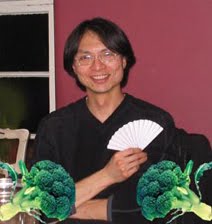20 December 2006
Working on my thesis desperately
I am now working desperately on my bloody, stupid doctoral thesis on Shanghai popular song, and hoping to meet the deadline; therefore, I won't be able to give you any new stuff on this weblog until I feel more confident, or probably more comfortable, of my work. Please bear with me for a wee moment. I shall be back as soon as possibel.
All the best and have a very happy Christmas and prosperous New Year.
PS. Poor me! Making a karaoke soundtrack while finishing my thesis. As I have promised my sister-in-law, my fiancée's youger sister, when I was still in Scotland that I would sing a Spanish love song, Aquellos Ojos Verde, for her and her bridegroom-to-be in their engagement reception, I am also now working desperately to make a karaoke soundtrack for it, because obviously they won't hire a cabaret band for me.
12 December 2006
Taipei is bloody hot!
I would never forget how most Taiwanese screech when a Siberian cold front moves south, striking the island in winter and causing temperature to plummet below 10°C. Goodness me, 10°C is actually quite mild! The average winter maximum in Lowlands Scotland is only 6°C !
Mum has been telling me every several minute since I came back: put on a jumper indoors and one more jacket when riding the scooter outside so that you don't catch a cold. I would like to be Mum's good, obedient boy, but I will be sweltering and then stifled to death if I muffle myself in these togs which I deem only appropriate in Scotland.
Just like Stirling, Taipei is surrounded by 'hills', yet Taipei city is located in the Taipei Basin and those 'hills' are actually 'mountains' ranging from 2,000 to more than 3,000 feet high. Thus, unlike Stirling which is 'mild' in winter, Taipei is indeed a steamer all year round.
Sorry, Mum, can't be asked to do what you demand. Blame the subtropical climate and bloody global warming.
11 December 2006
Recollect Paris on the silver screen
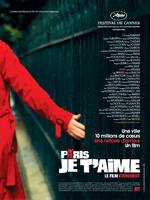 Having not watched a film on a real silver screen in Taipei for ages, I went to Vieshow Cinemas, a chain of multiplex cinemas which, if my memory serves me, used to be Warner Village Cinemas operated by the American-based Warner Brothers but was somehow sold to another entertainment group while I was away in Scotland.
Having not watched a film on a real silver screen in Taipei for ages, I went to Vieshow Cinemas, a chain of multiplex cinemas which, if my memory serves me, used to be Warner Village Cinemas operated by the American-based Warner Brothers but was somehow sold to another entertainment group while I was away in Scotland.Since I had heard of good comments on Paris, Je T’aime from friends and positive reviews of it from several websites before I came back, and by chance this film was still showing, I decided to spend a night for it.
So true are what those friends and critics said. Paris, Je T’aime is indeed a tour-de-force that triumphs where some other collaged films founder. It shows us that Paris, a city whose beauty, history and culture few places in the world match, can not only inspire French virtuoso directors like Francois Truffaut but can also fill directors from different lands with passion and enkindle their imagination of love to construct their own images of the city.
The two-hour Paris, Je T’aime is composed of eighteen short films, each of which is about five minutes long, shot in different arrondissement in Paris, written and directed by a different person, and played by a different set of actors or actresses.
This film reminded me of the week I spent in Paris in 2001 just three months after I left national service. As the eighteen shorts ran one after another, beauty and filth of the city, amiability and arrogance of the people, tranquility and cacophony in the air, serendipity and frustration during my short stay, and love and hatred in this life were all released from the deep chasm in the curst of my concealed memory.
Out of these eighteen short episodes, my favourite is Wes Craven’s Père-Lachaise, where a British couple bickered over their relationship while visiting Oscar Wilde's grave at a cemetery but finally their impending marriage was saved by the phantom of Oscar Wilde. Indeed, how dull would love be should your so-called earth partner, soul companion only do whatever pleases you and never quarrel over any single petty or significant matter with you!
I haven't got any opportunity to visit Paris again in the last five and half years though I did go to the Continent on several occasions. I miss the grandiose Arc de Triomphe as much as a romantic glimpse of any nameless street corner café. I don't know if I would love Paris as much as I love some cities in the British Ilses; nevertheless, I like the ambience.
What a night! fourteen months later, I came back to Taipei from Scotland to recollect a long forgotten vista in the course of my life.
07 December 2006
Fire alarm in Heathrow
 It's been over fourteen months since I left behind teeming streets and boisterous crowds in Taipei last September, and after unsleeping 50 hours crossing the Boarders, the Channel, the Continent, Near East, Middle East and Far East, with all the best wishes from friends, colleagues and people of the local community, as well as my incomplete bloody thesis, I'm back in my motherland.
It's been over fourteen months since I left behind teeming streets and boisterous crowds in Taipei last September, and after unsleeping 50 hours crossing the Boarders, the Channel, the Continent, Near East, Middle East and Far East, with all the best wishes from friends, colleagues and people of the local community, as well as my incomplete bloody thesis, I'm back in my motherland.When I'm in good health, I slumber when night draws on and arise when morning breaks. I suppose I'm sharp and in fine fettle at the moment as I have already regained my desire for food and can sleep well again, thanks to the amazing antidepressant. However, I didn't get a wink of sleep during the 8-hour journey on the overnight coach from Edinburgh to London, nor could I have even a catnap over the 16-hour flight from London to Taipei.
The insomniac way home is probably the most enervating travel I've ever had in recent years, yet I would say it is an unforgettable episode in the airport that made the whole journey extraordinary.
As I couldn't check-in until three hours before the departure and I just couldn't be asked to be confined within the crowded departure hall in Terminal 3 of Heathrow, I decided to hop around the four terminals. Taking the free shuttle train to slide to Terminal 4, I started my tour around London Heathrow.
After grabbing myself a cup of tea, I picked a seat on the '-1' level of the terminal building and started enjoying some peaceful time. Several sips later came the most unusual yet hilarious incident that has ever happened to me. The fire alarm started; it seemed that, according to the babbling announcement, the boiler or something caught fire. Jings, crivvens an' help ma boab (Don't know this Scottish phrase? Haven't read my previous post? Click here to get a clue)! I though Heathrow was under terrorist attack!
Although my first though is 'run', no one gave the ear-splitting fire alarm a damn. About one minute later, people started budging their bottoms reluctantly from chairs at restaurants, cafés and so on, and moving tardily towards the emergency exit. I followed them with two suitcases at my hands to the ground floor, where the check-in counters were, only to find that everything ran as usual as if the shrill and beating of the alarm hadn't ever existed. Those who were just 'evacuated' resumed their chatting happily and drinking or eating whatever they had.
Did I overreact?
Slightly confused while entertained (what a start of my journey back home!), I shifted to Terminal 2 and had a pint. I deserved it after this farcical evacuation.
30 November 2006
Am I with anterograde amnesia?
I think I've got a sniff of trouble.
For example, I always forget to take my mug with me when I decide to go to the kitchen and top up some more hot water. What is even worse is that sometimes I leave behind the mug in the kitchen after filling it up with hot water.
I always tell people the same story over and over again, particularly the infamous Broccoli Quadrilogy, even though they have been told thousands of times and can recite the whole story verbatim.
Here comes another example which I blush to mention: I always plan to bring a jar of my home-made blackberry jam to Maggie, a colleague in the Stirling Media Research Institute but never remember to put it into my bag before I go to the university.
According to researches, loss of short-term memory can be
- the result of damage to the hippocampus, fornix or mammillary bodies (all of these are certain parts in the brain);
- the consequence of a sudden trauma or a seizure;
- induced by medications of hypnotic drugs prescribed for insomnia and other sleep disorders, such as temazepam, lorazepam, zolpidem and alpidem;
- caused by large intake of alcohol.
Let me keep my fingers crossed: I'll remember my mug, stop telling people the bloody broccoli story, bring the jam to Maggie, et cetera, et cetera, et cetera...
28 November 2006
Go digital!
 Thanks to Hong-Lin, a reader in the School of Law, I've got a Ferguson FDT500, a set top box with which I can watch digital terrestrial television through the Freeview service.
Thanks to Hong-Lin, a reader in the School of Law, I've got a Ferguson FDT500, a set top box with which I can watch digital terrestrial television through the Freeview service.I wonder if everything was connected properly when she made her telly go digital, as although she said the box, original given by her brother-in-law, might have ceased to function, it is now working in good order in my room. There was no hassle when I set up the system: I am living within the Freeview coverage area, my landlady's rooftop aerial works perfectly, and, above all, the digital box has a harmonious relationship with the 20-inch analogue TV Pedro gave me this February when he went back to Portugal.
I came to know about digital TV two years ago when I did seminar teaching on the undergraduate course 'Media Impacts and Influences' in my department. The digital technology allows more TV channels and different interactive and information services to be transmitted in the same amount of space as that used by analogue transmissions. Consequently, switching to digital broadcasting system frees up airwaves for other uses such as mobile TV or high definition TV, and certainly brings more commercial oppotunities.
The UK government have set up a timetable for Digital Switchover, the switch-off of all analogue terrestrial TV broadcasts, and announced that TV services in the UK will go completely digital by 2013.
I don't care about how many channels I receive at the moment as I don't have much time to appreciate all the programmes, but I simply can't ignore the almost ninefold boost in the number of channels after installing the set top box – from only 5 to 44 TV channels, plus 24 radio channels. It reminds me of the days when I was in Taiwan, where about 85% of households subscribe to cable TV service, which usually provides about 100 channels on a fixed fee basis. Most of the time, unless when really into a specific programme, people would first flick through all the channels forward and backward, and then start channel-hopping.
As I'll be back in Taiwan for five weeks and thus be able to practise hopping over different channels with a remote control, I'll be ready to have a good hop after I return to Scotland with Hong-Lin's digital box and Pedro's analogue TV, although there are only 44 channels from Freeview, far less than the number in Taiwan.
24 November 2006
The Broons and Oor Wullie
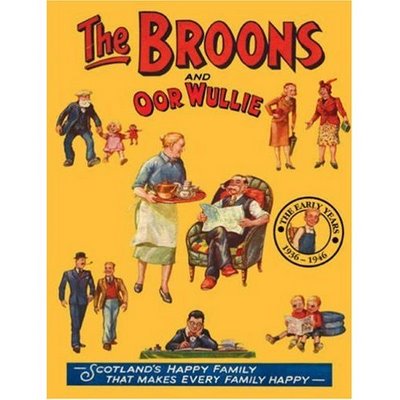
This afternoon I went to WHSmith to get a copy of The Scots Magazine, a must-read monthly for me to learn more about the land and the people, but ended up paying for a copy of The Broons and Oor Wullie, a collection of Scottish comic strips. Then I went for a pint of Best in Port Customs Bar, my favourite pub in Stirling where barmen or barmaids always remember my name and a pint is ready for me before I actually order.
Oor Wullie ('Our Willie' in the Scots language) and The Broons ('The Browns' in Scots) are both comic strips set in Scotland within The Sunday Post newspaper, which is published in Dundee by D C Thomson & Co Ltd and sets a model for written Scots and its spelling.
Although some linguists argue that Scots is an ancient dialect of English or the Anglic varieties spoken in parts of Scotland, Scottish people regard Scots as an autochthonous language (or in plain words, 'indigenous language') of Lowland Scotland, as opposed to Scottish Gaelic spoken by some in the Highlands and Islands.
In the pub, some regulars whom I am quite acquainted with came to me and asked if I understood what I was reading. Come on! I've been in Scotland for almost five years and spent some time learning the language of this country; of course I know some Scots. A lad picked up a line in the book:
Gran'maw's comin' tae stay wi' us, so ye must be a very guid laddie an' dae a'thing she tells ye!Of course I ken ('know' in Scots)
Grandmother is coming to stay with us, so you must be a very good boy and do all the things she tells you!Another old block still doubted if I really knew Scots and asked what it meant by
Whit a braw bricht moonlicht nicht the nicht.Ha ha ha, I happen to know it. It means
(Listen to my demonstration!)
What a beautiful bright moonlit night tonight.I'm going back to Taiwan a week Sunday for a five-week break. I would like to bring some copies of The Broons and Oor Wullie as Christmas gifts for my friends; however, it really worries me if they would ever understand Scots.
22 November 2006
If only I were on Mars

As I am approaching the deadline for thesis submission, I just wish I was on Mars, the fourth planet from the Sun in our solar system, named after the Roman god of war.
The rotation period of Mars is about 24.62 hours, which means that I would have about 37 more minutes a day if I were on Mars; the orbital period is 686.96 days and thus I would have almost 322 more days a year if I were doing a PhD on Mars. Moreover, 37 minutes are enough for me to write something in my diary to fulfil my obsession (please refer to the previous blog entry). Because it's always a tough task to find time to maintain my hand-written diary everyday, having some extra time every day is absolutely great.
Of course, it's just a matter of 'I wish I could' and the only thing I can do at at the moment is merely finishing my thesis as soon as possible. However, I do have a question: What sort of calendar or system of time will we use should we immigrate to Mars in the future?
Shall we measure time based on the rotation of Earth on its axis with respect to the stars, or shall we just ignore our mother Earth but instead only take into consideration the physical or astronomical characteristics of Mars?
Well, it doesn't matter for the time being as I don't think I would be able to move to Mars within six weeks and claim more time for me to finish the thesis. I definitely have to submit by the end of 2006 on Earth, otherwise I fail. But I'll advise my daughter, if I have one in the future, to do her PhD on Mars so that she may have more time.
20 November 2006
Obsession
 I truly believe that I am a sufferer of the so-called obsessive-compulsive personality disorder (OCPD, or another jargon, anankastic personality disorder), which is a mental disorder characterised by a general psychological inflexibility, a chronic preoccupation with rules, procedures, perfectionism and excessive orderliness.
I truly believe that I am a sufferer of the so-called obsessive-compulsive personality disorder (OCPD, or another jargon, anankastic personality disorder), which is a mental disorder characterised by a general psychological inflexibility, a chronic preoccupation with rules, procedures, perfectionism and excessive orderliness.It is my philosophy that everything in my world has its place in a divinely designed order (of course my own order, nothing to do with divinity) which can never be questioned by others. I enjoy filing things away, put things in neat order, tidying up rooms, washing dishes and on and on, all of which, most importantly, have to be done by proper procedures. All of these are absolutely symptoms of OCPD, and therefore I have to accept that I am indeed an OCPD suffer.
I have consulted some psychology and mental health literature, together with web sites of related foundations such as OCD-UK and OCD Action, and found that fortunately OCPD is not as serious as obsessive compulsory disorder (OCD).
OCPD is usually confused with OCD. They are actually two distinct disorders, although there is only one more 'P' in the former.
According to OCD-UK,
[OCD] sufferers experience repetitive, intrusive and unwelcome thoughts, images, impulses and doubts which they find hard to ignore. These thoughts form the obsessional part of ‘Obsessive-Compulsive’ and they usually (but not always) cause the person to perform repetitive compulsions in a vain attempt to relieve themselves of the obsessions and neutralise the fear.I don't think I have any concern about
contamination and germs, causing harm to oneself or to others, upsetting sexual, violent or blasphemous thoughts, the ordering or arrangement of objects, and worries about throwing things away.As I do not feel any needed to perform ritualistic actions repeatedly, for example, washing my hand every three minutes, but rather just tend to stress perfectionism above all else and feel anxious when I think something is not in compliance with the divinely designed order, I'm definitely not an OCD sufferer
I have been keeping a diary for about 18 years, to the extent that I feel I must write something down every single day and it is an offence to leave one day blank in my diary. Even when I am so tired, unwell or when I forget because of too much intoxication to write anything, I will definitely do it the next day.
I suppose the reason why my thesis moves so slowly must has something to do with OCPD – every word, sentence, paragraph, section and chapter has to precise, no-nonsensical and impeccable.
The deadline of submission is the end of 2006. I may have to compromise perfection for the sake of getting the doctorate.
17 November 2006
Engaged as a treasurer of a church
Actually I was quite surprised when the presbytery asked me to take on the responsibility, as I am just an international PhD student, frankly speaking, a foreigner, one of the others to this country. I suppose the presbytery understand that I have a degree of MBA with a speciality in accounting and was once employed by a charted accountancy firm, and thus my calibre for this position. Moreover, I believe that they regard me as a respectable member of the community.
It's always my belief to get myself involved in the local community in all aspects. Since I have chosen to go abroad for further study and paid an awful lot of tuition, I definitely should participate in as many as possible activities in this country, to learn more about the people, the culture and the land.
Whether I'll settle down for good in Britain, it'll be an unforgettable experience in my life to be a treasurer of a church in Scotland.
14 November 2006
Cider reminds me of Taiwanese 'apple sidra'
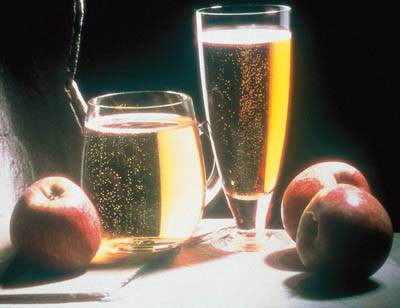
(Image from NACM)
Recently I found cider quite a good substitute for beer if a short break from bitterness of hops is what you desire. By cider, certainly I mean the alcoholic one.If you consult a dictionary, you'll probably find that cider refers to either an unfermented beverage or an alcoholic drink made by crushing fruit, typically apples. That's true, as in the States the alcoholic one is known as hard cider while the fresh, minimally processed apple juice is called cider or apple cider. Nevertheless, people in Britain never get confused. Wherever you ask for cider, you never get apple juice. Cider is definitely an alcoholic drink here.
Cider is very popular in Britain, particularly in South West England. Although, together with perry, a similar drink made from fermented pear juice, it accounts for only 6.4% of UK alcohol consumption, far behind beer (44.3%) and wine (27.1%), the UK has the highest per capita consumption and the largest cider producing companies in the world, according to NACM (the National Association of Cider Makers).
Cider usually has a stronger alcoholic content than beer, most of the time over 5%, although its alcoholic strength does vary from 1.2% to just under 8.5%; however, because the British government tax cider at a lower rate, in the UK it's always cheaper than beer in terms of price per volume.
Cider is the oldest alcoholic drink produced in the Britain. People once believed that it was brought in after the Norman Conquest of England in 1066, but it is now thought to have been introduced to the early Britons by some peoples who roamed over the areas in modern Spain and Northern France with their shekar, a Hebrew-origined word for an intoxicating liquor distilled from corn, honey or dates.
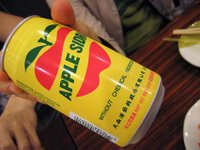 I have to admit that before I came to Britain, I had never tried the alcoholic cider. The only thing similar to it I knew was apple sidra, which has nothing to do with Gulf of Sidra, a broad inlet of the Mediterranean Sea on the coast of Libya, but is just a popular non-alcoholic fizzy beverage produced in Taiwan, probably something Westerners would call apple soda. The manufacturer chose the word sidra (indeed 'cider' in Spanish) for the product to suggest that although people would never get intoxicated when having apple sidra, they would still enjoy the sour-and-sweet tang of cider in it. (Image from this blog)
I have to admit that before I came to Britain, I had never tried the alcoholic cider. The only thing similar to it I knew was apple sidra, which has nothing to do with Gulf of Sidra, a broad inlet of the Mediterranean Sea on the coast of Libya, but is just a popular non-alcoholic fizzy beverage produced in Taiwan, probably something Westerners would call apple soda. The manufacturer chose the word sidra (indeed 'cider' in Spanish) for the product to suggest that although people would never get intoxicated when having apple sidra, they would still enjoy the sour-and-sweet tang of cider in it. (Image from this blog)Although sometimes I take cider as an substitute for beer for economic reason, it does remind me of my motherland Taiwan, where I used to drink apple sidra as I've never get along with coke.
12 November 2006
Ucipital mapilary?
In the end I found out that ucipital mapilary is the suprasternal notch (or in Latin lacuna suprasternalis), the visible, little indentation between clavicles (collarbones, the pair of bones joining the breastbone to the shoulder blades), which is regarded as the mark of true beauty.
If you are by any chance a medical student, doctor, anatomist or sort of forensic expert, don't tell me there is no such term in Gray's Anatomy, because it's actually a fictional term coined by the screenwriter Samson Raphaelson for the 1941 Hitchcock thriller Suspicion, in which an exchange between Johnnie Aysgarth (Cary Grant) and Lina McLaidlaw Aysgarth (Joan Fontaine) went:
Johnnie: Don't do that.Remember what Count Laszlo de Almásy (Ralph Fiennes) said to Katharine Clifton (Kristin Scott Thomas) in The English Patient?
Lina: Why not?
Johnnie: Because your ucipital mapilary is quite beautiful.
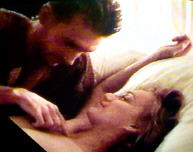
I claim this shoulder blade. No, wait. I want – turn over – I want this, this, this place. I love this place. What's it called? This is mine. I'm going to ask the King permission to call it the Almásy Bosporus.'This place' is indeed ucipital mapilary.
10 November 2006
American presidential election

(Click the picture to watch the film)One among latest international headlines this week is that Donald Rumsfeld resigned as U.S. Secretary of Defence after the Republican Party lost control of both the House of Representatives and the Senate in the United States midterm elections.
Personally, I am not all agog at US politics, an arena full of business tycoons, lobbyists, opportunists, speculators and feigned patriots; nevertheless, I was once forced to pay heed to it when I did seminar teaching on an undergraduate course 'Media Impacts and Influences' at the 2004 autumn term. To introduce to students and facilitate more discussion on how the media may play during an election period, I have to keep an close eye on 2004 US presidential election. I happened to find a sarcastic short online and then ripped it to my hard drive so that I could show my students how some people would despise the so-called democracy in the States.
The US midterm elections did remind me of this. Have a look and enjoy.
08 November 2006
Godiva cholocate and Lady Godiva

(Lady Godiva by John Collier, c1898)
Godiva is a well known Belgium chocolate manufacturer established by the master chocolatier Joseph Draps in Brussels in 1926. It is named in honor of the legend of Lady Godiva (or in old English Godgifu or Godgyfu, which means 'gift of God'), an Anglo-Saxon noblewoman and wife of Leofric (968–1057), Earl of Mercia and Lord of Coventry.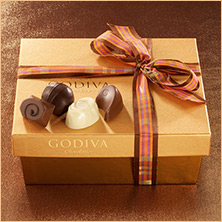
A historical legend behind luxurious chocolate?
According to folklore, in 1057 Lady Godiva appealed to Earl of Mercia for reducing cruel taxation imposed on the people of Coventry. Time and time again her husband refused, and in the end only granted her request, provided that she rode naked throughout the streets of Coventry. She agreed. After announcing that all the people of the town should stay indoors or shut windows, clothed only in her long hair, she rode through the midst of the town. The citizens of Coventry graciously stayed inside to spare their benefactor any feelings of shame. Godiva's husband kept his word and thus the people of Coventry were finally relieved of the weighty tax burden. Today we can see a statue of Lady Godiva in Coventry city centre in memory of her deed.
There was an incident. A tailor named Tom defied Lady Godiva's order. As a voyeur probably first recorded in history, he made a hole in the shutters to look out while Lady Godiva passed by on her nude ride, and was reportedly struck blind by a divine light the moment he saw her. He became known as Peeping Tom, and Peeping Tom later became a term referring to one who derives pleasure, usually sexual, from secretly spying on others. True or not, this definitely reminds us of what Confucius says: 'See no evil' (Fei li wu shi, literally 'look not at what is contrary to propriety').
Next time when you recieve or give a pack of Godiva, don't forget to tell your friend the legend of Lady Godiva.
06 November 2006
Chanel N°5 on Channel 5
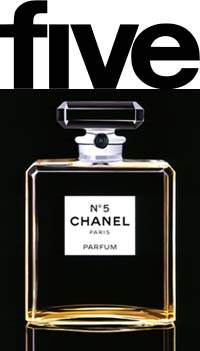 Last week when I was filing away some trade magazines into the shelves in the Stirling Media Research Institute, an odd job kindly offered by the department office, I spotted an complimentary book entitled The End of the Question Mark. It's just a wee pocket book containing some tough questions which I suppose are usually asked in quiz shows or pub quiz nights. I skimmed through the pages and was caught by a particular item: What was the first advert on channel 5?
Last week when I was filing away some trade magazines into the shelves in the Stirling Media Research Institute, an odd job kindly offered by the department office, I spotted an complimentary book entitled The End of the Question Mark. It's just a wee pocket book containing some tough questions which I suppose are usually asked in quiz shows or pub quiz nights. I skimmed through the pages and was caught by a particular item: What was the first advert on channel 5?Channel 5, or simply five as per its logo, is the British fifth and presumably final national terrestrial TV channel. The other four are BBC One, BBC Two, ITV and Channel 4. Therefore, in Britain, if you do not subscribe to Sky TV or any other kind of digital TV, you can watch only five analogue terrestrial channels. Interestingly, while the other four channels can be received in Ireland, Channel 5 is the only British terrestrial channel without any availability there.
Channel 5 was launched at 6 pm on Easter Sunday 30 March 1997 with the performance of a cover of Manfred Mann's 60s hit '5-4-3-2-1' by Spice Girl. Like ITV and Channel 4, Channel 5 is also a commercial channel and thus there are always adverts. According to The End of the Question Mark, the first advertisement on Channel 5 was for the iconic perfume Chanel N°5. Very smart, isn't it? Chanel N°5 on Channel 5.
I have no idea nor can I locate which commercial film for Chanel N°5 was shown then on TV; however, I managed to find out a relatively new one featuring Nicole Kidman. Click here and have a look. No man could resist her charm.
She swung a $12m deal of filming a series of adverts for this best known fragrance in October 2003.
Brand names and their extended usages

For example, hoover, originally the name of an American floor care manufacturer, the Hoover Company, which once dominated the electric vacuum cleaner industry, became a synonym both for the noun vacuum cleaner and for the verb vacuum probably in 1926-27 according to Oxford English Dictionary. Xerox may be another example, although it's less used nowadays as opposed to hoover.
More brand names of software and service have been used in this fashion since the Internet became an essential part of our life. I heard people saying google when referring to using an Internet search engine and using MSN and skype when speaking of chatting online through these two programmes.
I'm sure there are more brand names adopted in the English language and used as verbs or common nouns. Nevertheless, have you noticed any high-tech item which is a must for the modern world? Keep a record of some brand names and see if they will become verbs or common nouns in your lifetime.
03 November 2006
Pork stew, first dish after regaining appetite

Finally, I regained my desire for food this week. I purchased some decent streaky pork from the butcher and made a pot of pork stew for myself on Wednesday. As I couldn't really scarf down all of it nor would I leave it in the fridge for more than two days, yesterday Rebecca came to help me bring the stew to a good end.
It is no difficult task to do pork stew, but what make these pork chunks lip-smacking in my pot are the creative spice and sauce mixture and some other subordinate ingredients:
- Carrots, tomatoes, Granny Smith apples and close cup mushrooms
- Anise, freshly ground pepper, crushed sun-dried chilli, oregano, garlic and ginger
- Soya sauce, honey, balsamic vinegar and salt
- Cut streaky pork into chunky cubes and marinate them in the spice and sauce mixture.
- While pork is in marinade, cut Carrots, tomatoes, apples and mushrooms into pieces of desired sizes.
- Quick stir-fry pork cubes, together with the marinade, in a wok on high heat, and then transfer them to a pan.
- Put carrots, tomatoes, apples and mushrooms in the pan and add enough boil water to cover all the ingredients.
- Bring to quick boil, turn heat down and simmer for one and a half hours.
For eating healthy and adding a contrast in mouthfeel, apart from carrots, tomatoes, apples and mushrooms already in the stew, one more blanched leafy vegie (I strongly recommend Chinese leaf cabbage) can be served at the same time. This dish is best served over rice.
Yummy beyond description was probably what Rebecca could say. It's a pity Hong-Lin didn't join us, although I was sure there wouldn't have been enough for three had she come.
01 November 2006
Austin Powers sound board
Austin Powers, hm, the chap who once made me abashed, not because of his explicit langauge or act, but of my own ignorance.
Yes, I am a PhD student finishing a thesis on popular music, and indeed have read popular culture and mass media. However, in my own ivory tower full of esoteric, over-specialised, and probably useless research, I can only understand things "once" popular donkey years ago, rather than something popular at the moment. My colleagues are usually flabbergasted when I ask, with a slightly bemused expression on my face, what this film is about, who that chap is, or when on earth that comedy was produced.
I still remember how Mark responded when I told him I hadn't heard of The Muppet Show all my earthly life. I also remember how I startled some colleagues by casting out a question about the identity of this movie character when Mark gave a paper on film music with Austin Powers as an example in our departmental research seminar about two years ago.
No, I swear I'd never seen the Muppets and Austin Powers, not even heard of them! Nevertheless before I came to Stirling. Nevertheless, It doesn't matter anymore. I know them now, although there are still a horde of popular figures awaiting me.
31 October 2006
Sir Paul McCartney's fourth classical album
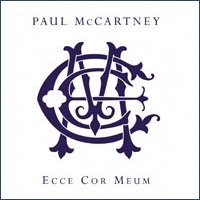 While working on the last two albums, a towering project was under incubation. In 1998, he was invited by Anthony Smith, the former President of Magdalen College Oxford, to compose a choral piece for a new concert hall of the college. Eight years later after the commission had been accepted, Paul's fourth full-length classical work, Ecce Cor Meum (Behold My Heart), for choir and orchestra in four movements, with an interlude featuring oboe solo, was released by EMI Classics on the 25 of September 2006.
While working on the last two albums, a towering project was under incubation. In 1998, he was invited by Anthony Smith, the former President of Magdalen College Oxford, to compose a choral piece for a new concert hall of the college. Eight years later after the commission had been accepted, Paul's fourth full-length classical work, Ecce Cor Meum (Behold My Heart), for choir and orchestra in four movements, with an interlude featuring oboe solo, was released by EMI Classics on the 25 of September 2006. This album is produced by John Fraser and recorded at the legendary Abbey Road Studios. Gavin Greenaway conducts the Academy of St Martin in the Fields, the Boys of King’s College Choir (Cambridge), the Boys of Magdalen College Choir (Oxford) and London Voices.
Since Ecce Cor Meum is sort of 'classical' classical music, rather than 'contemporary', 'atonal' or 'avant garde' classical music, composing such a work requires compositional techniques, such as harmony, counterpoint, orchestration, musical form and so on. I suppose either Paul is a great musical mastermind so he doesn't need any musical theories when composing, or he has actually spent some time hitting the books and then brought his own musical experience into theories.
Although I was never a pupil of music nor did I read music at any institution, I familiarise myself with all sorts of compositional techniques through endless reading and experimenting. Nevertheless, I can't compose an oratorio.
Hail Paul.
27 October 2006
Major differences between Chinese traditional and Western bel canto singing

Over so many sleepless nights, I have been wondering if I would really screw up my PhD and disappoint all those who have been supporting me. Moving slowly, and unsurely, is my thesis; however, I have to perk up and keep writing no matter how much the thesis seems to be bunkum and balderdash. At the moment, I am struggling to finish a section on the singing styles of the 30s and 40s Shanghai pop song.
Although everybody knows Chinese traditional singing (for example Beijing opera) are very different from the Western bel canto (for example a dramatic tenor in a Verdi's opera), few people really know what makes the difference.
Hence, I copy some boring, technical, academic words from my thesis and paste them here. Read them patiently, if you think they may be interesting, but don't blame me for using technobabbles.
A fundamental difference is that Western and Chinese vocal techniques deal with the resonating cavities differently. According to the part of human body in which the sound a singer makes mostly resonates, singing voices may be categorised into three registers indicating the changing tonal qualities from pitch range to pitch range: the chest, the middle and the head voices.
The chest voice denotes a singer’s lower range of voice, which generally resonates in the chest cavity, and is usually described as having deep, weighty quality. The head voice is associated with bright, light singing voice of the upper end of a singer’s vocal range, which resonates in the mouth and the head cavities. The middle voice refers to the warm, rich singing tones of a singer’s middle pitch range resonating in the throat cavity, which is sometimes regarded as the crossover between the chest and head voices.
 The Western classical singing style, or precisely the bel canto, is characterised by even vocal quality with the greatest amount of resonance along the whole of a singer’s voice range and every singing note smoothly merged with the next to produce continuous lines. To achieve this, a singer has to utilise all resonating cavities properly, maintain a fine balance among various voice registers, and develop seamless transitions between registers. Singing in this style, one is required to be able to place the head voice down to the notes that are normally produced as the chest voice, and vice versa. In other words, a trained vocalist would adjust the amount of resonance in different cavities to gain consistent tone quality throughout the singing range. For more favourable resonance, the larynx is lowered to expand the bottom of the pharynx and sometimes there are even adjustments in the usual pronunciation of vowels.
The Western classical singing style, or precisely the bel canto, is characterised by even vocal quality with the greatest amount of resonance along the whole of a singer’s voice range and every singing note smoothly merged with the next to produce continuous lines. To achieve this, a singer has to utilise all resonating cavities properly, maintain a fine balance among various voice registers, and develop seamless transitions between registers. Singing in this style, one is required to be able to place the head voice down to the notes that are normally produced as the chest voice, and vice versa. In other words, a trained vocalist would adjust the amount of resonance in different cavities to gain consistent tone quality throughout the singing range. For more favourable resonance, the larynx is lowered to expand the bottom of the pharynx and sometimes there are even adjustments in the usual pronunciation of vowels.In contrast, rather than seeking to produce consistent tone quality across the entire voice range by using different resonating areas accordingly, in the Chinese traditional singing style, a vocalist sings principally in the head voice and develops brighter and lighter tones resonating mostly in the hard palate, the nose cavity and the head cavities. Therefore, resonance of sounds is fixed principally in the anterior part of the head. When singing, the larynx is positioned higher than it is in the bel canto style, and there is more laryngeal muscle tension. As every syllable has to be enunciated precisely, the pronunciation of a vowel is never modified for the sake of optimum resonance.
Generally speaking, due to the differences between vocal techniques, while using the bel canto method, a singer tends to produce mellow, round and open-throated sounds, singing in the Chinese traditional fashion, a singer’s tone quality is relatively nasal, bright with more tension in the throat.
Is it clear?
24 October 2006
Earning petty cash
Online surveys and some consumer sites are good bets. So far, I've joinedThese sites do gross me some cash. So far, I've got 700 Nectar points (worth 3.5 pounds in Sainsbury's) from MyTNS, 10-pound Tesco voucher from Valued Opions, 500 Taiwanese dollar cash (slightly less than 10 pounds) from CyberPanel, 500 Taiwanese dollar cash from EmailCash, 10-pound Bella Italia voucher from Pigsback and 15-pound gift voucher by keeping a two-week food diary for a project referred by MyTNS – that's about 60 pounds in total!
Well, although not a big fortune, all of these help towards the cost of living for poor Wei. If you are interested in earning some extra petty cash, try the above-mentioned websites.
22 October 2006
Mr Bean and I
 Do I look like Mr Bean in any way? I don't know, but somehow more and more Taiwanese friends have been telling me that I'm Taiwanese Mr Bean ever since my fiancée made this comment long time ago.
Do I look like Mr Bean in any way? I don't know, but somehow more and more Taiwanese friends have been telling me that I'm Taiwanese Mr Bean ever since my fiancée made this comment long time ago.I suppose because I have been trained up to understand British dry humour over the past four years and started practising all sorts of sparkling combination of British witticism and gesticulation in real life, those Taiwanese friends simply regard whatever they can't grasp from me as British humour and characteristic of Mr Bean.
I don't mind what they think; nevertheless, I just can't recognise any similarity between me and Mr Bean, or Rowan Atkinson. Last night I mulled over all various possibilities how on earth I could be related to Mr Bean, and finally arrived at an inescapable conclusion: I am a victim of the blasted media.
I won a DVD set of Mr Bean 10 Years Collection, which includes all the 14 episodes broadcast from 1990 to 1995, two unseen episodes and a documentary, on eBay a few weeks ago, and have been watching one or two episodes everyday ever since. I believe these comic episodes have made certain impacts on me.
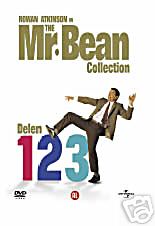 Of course I don't fall into hilarious situations, nor do I cook up any schemes or contrivances in the way Mr Bean does to solve problems. However, somehow, I start having silly and quizzical expression on my face when I feel disoriented or stranded in a sticky situation, or after I screw up something. Even worse, my hands also begin wagging in a moronic way.
Of course I don't fall into hilarious situations, nor do I cook up any schemes or contrivances in the way Mr Bean does to solve problems. However, somehow, I start having silly and quizzical expression on my face when I feel disoriented or stranded in a sticky situation, or after I screw up something. Even worse, my hands also begin wagging in a moronic way.Pedro writes here that Natascha Kampusch, the Austrian girl who was abducted and detained for eight years, learnt how to behave and talk 'properly' from what she saw on telly. I supposed she didn't watch Mr Bean.
17 October 2006
Chinglish in Beijing
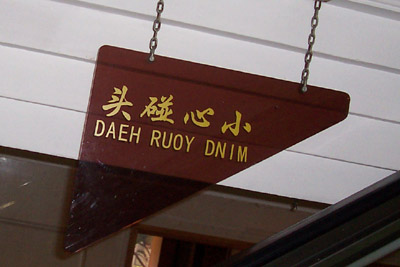
(When in China, do as the Chinese do – read from right to left!)
In a bid to build up the city's international image, as well as to create a sound and smooth language environment for the 29th Summer Olympic Games in 2008, Beijing launched a campaign to improve its bilingual signs four years ago. The municipal government set up committees, task forces and all sorts of projects to undertake major construction work: the removal of all signs written in Chinglish.Chinglish, obviously a portmanteau of 'Chinese' and 'English', may refer to the pidign English which is profound influenced by Chinese grammar and accent, or the broken Chinese woven with English words used by some American-born Chinese who, due to their limited Chinese vocabulary, use English words all the time when speaking Chinese. However, in Beijing Chinglish refers to awkward translation arising from incorrect grammar, non-idiomatic phrases, erroneous vocabulary usage and coined words.
Take a look at some examples:
- To take notice of safe: The slippery are very crafty
- Extraordinary Door
- Deformed Man Toilet
- Engine room is a serious place
- Please don't stand, sit and pass through the surface of water feature
- The luxuring nothing rail remote controlling stretches out and draws back the door
- Be careful, slippery slopes
- Emergency Exit
- Disabled Toilet
- Caution – Engine room
- Please don't stand, sit or walk by the side of the pond
- Deluxe wireless remote controlled retractable door
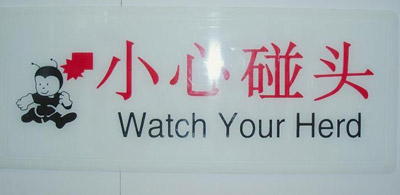
(What sort of herd shall we watch? Do cattle or sheep usually graze in department stores in Beijing?)
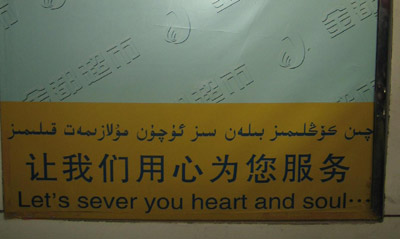
(What a horrible supermarket where customers end up being slaughtered physically and spiritually)
I hope all signs written in such a rib-tickling, and sometimes almost incomprehensible, Chinglish language can be supplanted by proper signs in the run-up to the Olympic Games so that foreign visitors and Olympians will not get scared or lost in translation.
16 October 2006
Resist or retreat?
As often as not, once-besotted, starry-eyed people metamorphose from best companions on earth into archenemies just because one side suddenly find that the relationship is foredoomed, or simply because one side is falling for another romantic entanglement. It is never easy to be on either side of a breakup, and thus how to break up gracefully is indeed art, as much as how to enter into courtship. That's why I have to be punctilious in proposing to split up.
Preparing a farewell address is probably even more difficult than writing an introductory chapter for a PhD thesis. It took me five months to finish the first chapter of my doctoral work in my first year, then one month to turn it into an article for an academic journal, and finally almost two years to get it published, but how long will it take to orchestrate a parting tune?
I don't know. My mind is flummoxed at the moment.
In the sphere of academia you publish or perish; over the tortuous course of studying a foreign language you write or rot; on the meadow where love blossoms you resist or retreat. I have been doing fine in the first two arenas. I have three articles published in academic journals and one in a government gazette; I maintain a weblog and keep writing in English. However, I decide to retreat, to withdraw from the coliseum of love as I know there is no Camelot for me.
Is it really a wise option to forgo a fractious yet still solid relationship and start being tortured by an unrequited affection for a perpetually unavailable diva, or is it better to reset the discolouring relationship to default? Whatever, I gather I was anathematised right at the beginning.
13 October 2006
How to make it up to make up for it?

(Spiffy Monica at a year-end party, early 2005)Phrasal verbs in English are always nightmares to non-native speakers, particularly to those who have just started learning this language.
Having spending years in polishing up my rusty English, I am now advised not to use phrasal verbs in academic writings, for they are less formal, and sometimes even equivocal, and thus not appropriate in serious works. Crikey, how could it happen? I am told to forget about what I have gained from years' hard working.
To name a few, 'examine' is preferred to 'look into', 'capitulate' looks smarter than 'give in', 'convalesce' gives a more precise notion than 'get over', and so forth.
Anyhow, I do miss those days when fellow classmates tried their best to learn as many as possible phrases, or simply 'make up' their own phrases. I still remember a classic example in a cloze test.
John and Mary made __ after the quarrel last night.Nine out of ten students would guess the missed word to be 'love', notwithstanding that 'up' is in fact the correct answer.
Although 'make up' denotes 'reconcile' here, this phrasal verb may carry different meanings in different contexts. A case in point comes from an amusing conversation with Monica over MSN this morning.
I told her that I started keeping a diary 18 years ago, and have become incurably obsessed about writing something in my diary every day ever since. However, when I go on a binge and can't be asked to do so before collapsing into my berth, I will definitely make up for it first thing in the morning.
While by 'make up' I mean that I will write my diary next morning to 'mend' the inexcusable mistake – falling asleep before the daily task is completed, Monica thought I would 'concoct' a story of the night before.
I shall tell Monica that I will never make up a story about how I tried to make up for a semantic misunderstanding in order to make up with her.
I'm sure this sort of sentence will never appear in my thesis; otherwise the examiners will get cross.
12 October 2006
Ilha Formosa

Have a look at this over-ten-miniute long promotion video produced by the Tourist Bureau of Taiwan to gain a snapshot view of my motherland.
The theme song in this video is Ilha Formosa, i.e. 'beautiful island' in Portuguese, an unofficial name which Taiwan was dubbed in 1544 when a Portuguese ship spotted the island. Taiwan has been know as Formosa ever since.
Mute telly or deaf pubgoer?

I've got a question for some publicans and clublords in Britain: What's the point to have TVs on the premises should customers can't hear a single word or whatever sounds on TV?
Since time immemorial there have been TVs in pubs or clubs with images budging on the screens and the volume turned down to an inaudible level, or simply switched off, against backdrops of head-banging music. I just don't understand what those mute boxes are for if nobody can twig what's really going on.
Maybe some would argue that in sports programmes, such as a live football match or golf tour, images talk for themselves. Therefore, what matter if we cannot hear those commentators?
I can't agree anymore. It's true that you don't really need to hear what the commentator say when watching Premier League or Six Nations, but can you make any sense of what's under discussion in the news, particularly when a guest is commenting on a particular issue live in the studio, or what's happening in a soap, or what a song is about in a music video, if all you have are jiggling human bodies with the accompaniment of some thunderous music totally irrelevant to what's on the screen?
I don't think it's any easy. So, can somebody tell me about the raison d'être of a mute telly in a pub or club? Or shall we pretend as if we were hearing impaired and thus it didn't matter whether the volume was on?
09 October 2006
An alternative version of Braised Lionhead

Reduced items in the clearance shelf of a supermarket can sometimes arouse a brainwave and give you a bright idea of what to eat.
As usual, I did my weekly shopping after Sunday service in the Church of the Holy Rude. I was just not particularly interested in beef today, but somehow a pack of lean cubed beef steak, a reduced one, caught my eye. Since it was almost past its 'best before', I supposed it might not be good enough for broiling, but could still be succulent if made into meatballs. I had seen this item scarcely when it come to my mind that beef meatballs in super mega hot spicy soup would be the main course for dinner.
I hand-minced those cubes with my everlasting cleaver, which has been with me since fifteen years ago when I started to learn cooking, then mixed beef mince with crushed garlic, smashed ginger pieces, an egg and some water, fiercely stirred all of them for twenty minutes, and finally made the mixture into balls. Deep-fried them and put aside.
Voilà, I've got my meatballs.
As for the super mega hot spicy soup, I tried first to create a piquant paste of spices, herbs and grease. Cumin, bay leaves, smashed stoned dates, chilli oil, Szechuan pepper, star anise, soya sauce, cinnamon and freshly crushed chilli were gently heated in sunflower oil and reduced into a thick paste. I then prepared the soup by boiling shredded Chinese leaves (cabbages) in chicken stock and stirring the paste into it.
Ta-dah, the soup was done as well.
At last, I put the meatballs into the soup, brought them into a quick boil. The main course for dinner was ready. It's an alternative version, i.e. my own version, of a Chinese dish, Braised Lionhead (Click here to see the authentic 'Lionhead').
It's a pity that Pedro was not here as these meat balls, I guess, are one of his favourites among my specialities. We had so many good times with Braised Lionhead, which used to be our team name when we attended pub quizzes, though we never won.
07 October 2006
Mid-autumn festival
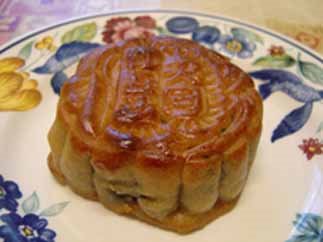
(bloody extravagent Cantonese-style moon cake)
Today is the fifteenth day of the eighth month of the lunar calendar, the Chinese mid-autumn festival, one of the three most important festivals in the lunar calendar (the other two are the Chinese New Year and the dragon boat festival), on which family members reunited.As the eighth month of the year is the second month of autumn according to the Chinese lunar calendar, the festival being named mid-autumn is self-evident. Nevertheless, when introducing this festival to my Western colleagues, I usually refer to it as harvest moon festival, since the 'mid-autumn' day usually falls around the autumn equinox and the full moon occurring nearest to this equinoctial point is called the harvest moon in the West.
The century-old tradition is a night-out on this particular day, certainly neither clubbing nor pub-crawling, but rather, admiring the fullest and brightest moon of the year. Moon cakes and pomelos are the main festive food.
Haven't got a clue what they are? Read this BBC news article to know more about moon cakes and this Wikipedia entry to study this citrus fruit.
Somehow, since the mid 1980s, barbecue has become a ritual of this festival in Taiwan. Some Taiwanese folklorists argue that having barbecues on the mid-autumn festival is just a westernised form of celebration, which reflects the thriving economy and uplifted living standard in Taiwan at that time.
Actually, not only in the Chinese but also some other Asian people celebrate this festival. For example, in Japan, the brightest moon on this day is known as chyûshyûnomeigetsu, literally 'the bright moon of mid-autumn', while the Koreans call it chuseok, which means 'autumn night'.
Moreover, whereas Korean people eat 'pine cake' (songpyeon, a crescent-shaped rice cake steamed upon pine needles) on this 'autumn night', the Japanese usually have 'moon-gazing cake' (tsukimidango, a glutinous rice dumpling), taros, soybeans and chestnuts beneath 'the bright moon of mid-autumn'.
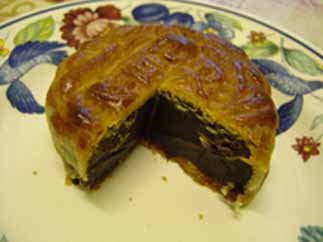
(the luscious adzuki paste filling)
Another 'mid-autumn' in Scotland for me. Although I didn't have a barbecue, as I suppose it would be loopy to summon my colleagues to sort of harvest moon BBQ at a windy, chilling night in Scotland, I still managed to grab myelf from a Chinese supermarket some bloody expensive moon cakes, which are actually imported from Hong Kong. However, it's a pity that we don't have pomeloes in Scotland, nor is any shipped in.02 October 2006
Stop for now ≠ quit for good
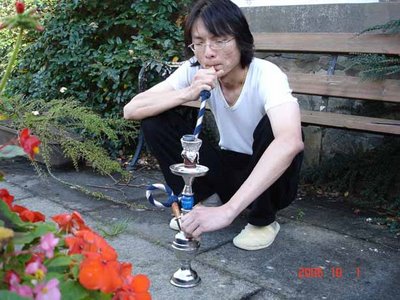
I stopped smoking ten days ago. When I tell people so, including my GP, I get either of these two responses:
- Oh, brilliant! Good for you! (Of course, smoking is no longer kicky nowadays.)
- Goodness me, I don't even know you smoke! (As I'm not an addict, people rarely notice that I puff fags from time to time.)
I would say that cigarette smoking is really an extravagant pastime in Britain as opposed in Taiwan: it costs about £5.50 a pack of twenty cigarettes here while it costs only £10.00 a carton, which contains 200 cigarettes, in my homeland. Therefore, instead of paying exorbitant amounts here, I usually cough out only £6.00 in the airport in Taiwan and bring back a carton of duty-free cigarettes, or just ask a friend or my fiancée to send me some from Taiwan.
Unfortunately, I haven't been back to Taiwan for more than a year, and suddenly both my friend and fiancée refused to send me any more as they claimed that they would no longer aid and abet chronic suicide.
Nevertheless, fortunately, I'm not addicted to smoking; I'm always fine without ciggies in my daily life. I can stop and resume at any time.
Well, although I don't have any cigarettes in stock, I do have some shisha, tobacco mixed with molasses and fruit flavours to be smoked in a hookah, and the gadget for shisha smoking. So I set up my hookah, a precious gift from a very good friend, and had a good puff at the weekend.
I don't think I would bother to smoke shisha as often as I would smoke those blooming cancer sticks, as it's absolutely vexing to assemble the entire hookah. Click here to see the step-by-step instruction and you will know how I can't be asked to do this.
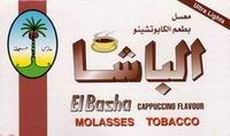
Anyway, the interesting cappuccino-flavoured molasses did offer me a rather good first experience of shisha smoking. I've never thought that apart from nicotine I could sniffed in the piquant taste of the Italian beverage with crema and steamed milk when smoking. Next weekend it'll be cherry or grape, and I'll see how fruits go with tobacco.
30 September 2006
Audition for embarking on the operatic society

(Image ©2003 Hamid Bahrami)Entering the fifth year of my life in Scotland, or from a wider perspective, Britain, I'm surely getting closer to my doctorate on the one hand, but on the other, I'm apparently retreating into the past to rediscover what are gradually fading into oblivion and giving way to other modern audio-visual entertainment.
I joined the Choir of the Church of the Holy Rude in October 2002 immediately after I arrived in Stirling, and have spent almost every Thursday evening for the choir practice and Sunday morning for the worship service ever since.
In November, with a zeal to embrace great choral works rather than merely to be confined in church anthems and congregational hymns, as well as encouraged by some elderly ladies in the church choir, I joined the Stirling University Choir.
However, probably because I am a fastidious, stubborn pedant and can't be asked to sing Brahms in English, I left the choir after singing Brahms's Ein deutsches Requiem in English at a concert in Dunblane Cathedral in May 2003. Speaking from a personal, and maybe biased, standpoint, replacing the original language in a vocal work, be it an art song, choral piece, opera or musical, with another language is absolutely bastardisation.
How can we distort the sound that was neatly designed by the composer simply to accommodate to the singer's or audience's language competency?
In September 2003 I switched to the Stirling City Choir and became the only Oriental face there. I love the city choir, although most members are senior citizens, and gents are always outnumbered by about three times the number of ladies. This is fairly common in Britain – choral societies are no longer appealing to the young generation, and men would spend more time in pubs or football matches.
On Wednesday, just three days ago, I joined the Stirling and Bridge of Allan Operatic Society, where, unlike the church choir, university choir or city choir, which are sort of all-encompassing and require no auditions, a musical director and a committee assess all new comers' musical ability.
It was an interesting rain-soaked evening. Having been practising my audition piece 'On the Street Where You Live', a song from the Broadway musical My Fair Lady, for several days since I made up my mind a week ago to expand my musical territory, marching on the field of operas and musicals, I crooned this show tune in a dazzling voice against the splash of a downpour outside the hall of Allan Park South Church.
Hardly had I finished the first verse, just a third of the song, before the musical director stopped me and said, 'enough, enough, that's good enough.' He then asked me to sing scales in order to assess my vocal range. Apparently satisfied with my E-g', wide enough for a baritone-bass, the musical director and the committee commenced a confidential meeting while I withdrew into the corridor. Three minutes later, they came out to congratulate me with a pithy remark: 'You're in!'
What a 'daunting' audition! It seemed that I had been preparing a formal speech, as formal as an address to Parliament and it turned out to be a casual chat. Anyway, I'm in the operatic society, exploring a dwindling tradition of British social life.
27 September 2006
Why chen1923?
It is a truth universally acknowledged that in the cybernetic era finding a unique user ID for yourself is no longer an easy task. As I'm quite convinced that user names such as szuwei, swchen or simply swc had all been reserved before I was born, I wouldn't even try to register myself as any of them. I gather chen1923 may be a good option as opposed to other combinations of my forename and surname.
As for the significance of 1923, I would say that while chen is self-evident and thus needs no further explanation, 1923 is sort of ticklish because 1923 is a momentous year in modern history. Although I'm not a history geek, some historic events of 1923 shall never be effaced from my mind.
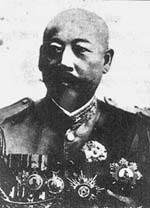 (The bribing president Cao Kun)
(The bribing president Cao Kun)In China, Cao Kun (曹錕) acquired the presidency in 1923 by suborning members of parliament with 5,000 dollars each, bringing ignominy on the warlord Government (北洋政府) and its assembly, which lacked a quorum to even organise elections.
In the Soviet Union, Vladimir Lenin suffered his third stroke. Inarticulate and bedridden, he retired his position as Chairman of the Soviet government. In the States, Warren Gamaliel Harding, the 29th president, died from a stroke in office.
In 1923, the Greek opera diva, perhaps the best-known opera singer after WWII, Maria Callas was born in New York.
Also in 1923, Wilhelm Conrad Röntgen, a German physicist who induced and detected x-rays, an achievement with which he earned the first Nobel Prize in Physics in 1901, died in Munich.
Still in 1923, William Butler Yeats, an Anglo-Irish poet, was awarded the Nobel Prize in Literature for what the Nobel Committee acclaimed as 'his always inspired poetry, which in a highly artistic form gives expression to the spirit of a whole nation.'
Again in 1923, the calamitous Great Kanto earthquake (関東大震災) devastated Tokyo and Yokohama and killed more than 142,000 people.
Okey-dokey, there may be even more incidents in 1923; nevertheless, none of them has anything to do with my user ID. But why 1923?
After rendering an blooming lengthy account of 1923, I have to say (can't be any simpler): Szu-Wei Chen is my name, and s is the nineteenth letter of the alphabet and w the twenty-thrid; therefore 1923.
26 September 2006
Mind reader? I wasn't born yesterday.
I found this flash game on Adam's cartoonlife. While Adam thinks he might be too credulous or this game is quite clever, I can just see through the hoax. It's just a mathematical trick.
Say we have 10p+q as our two-digit number, when we add together both digits, we get p+q.
If we substract the total of these two digits from the original number, we have (10p+q)-(p+q), which is indeed 9p.
Hence, whatever two-digit number we have, the final number is always a mutiple of nine. By the way, since p is no greater than 9, 9p would merely be 9, 18, 27, 36, 45, 54, 63, 72 or 81.
Now have a closer look at the chart. Have you notice that in the chart the symbols next to 9, 18, 27, 36, 45, 54, 63, 72 and 81 are all the same, though it changes every time when you click 'Try again'. Obviously, symbols next to other numbers are just red herrings.
There is no magic; whenever you are amazed by certain magic, you are just beguiled by a neatly designed device.
25 September 2006
To win or not to win, that is out of the question
 (Worthless prize: pig stress reliever)
(Worthless prize: pig stress reliever)'To be or not to be, that is the question.' (click here to see the full text)
He or she who speaks English must know this famous phrase, which originates from a Shakespearean soliloquy uttered by the revenge-seeking protagonist in Act 3, scene 1 of The Tragedy of Hamlet, Prince of Denmark. Throughout the whole of his monologue, Hamlet ponders over the dilemma of continuing life or resorting to self-destruction.
Those who study A-level English or have a penchant for drama may have come across some comments on Hamlet's soliloquy, such as the argument that these words reflect how a person's irresolute mind impedes realisation of thoughts and visions, or the viewpoint that the monologue is a debate on suicide.
What Hamlet mumbles actually has nothing to do with me, at least not for the time being, although I was also once dropped into a slough of despond. I'm just imitating the syntactic arrangement of words. Unlike Hamlet who still gives himself the final verdict on his to be or not to be, to win or not to win can never be a question to me, but rather a matter of probability, over which I have no control.
I moved in the house where I am currently staying last August. Before I crossed Victoria Green, moving from Clarendon Place to Victoria Place, I never won anything in any competition. It might just be coincidental, but there must be certain power in this house so much so that since I lodged here Lady Luck has been brining me some valueless yet useful booties.
To name a few items I've won so far:
- Concert tickets to the World Premier of Tlep at the Royal Albert Hall, won with CLASSIC FM
- Cinema tickets to any ODEON, UCI or thefilmworks cinema in the UK and Ireland, sponsored by Renault Clio, won with METRO;
- Breville silver filter kettle with BRITA water technology, won with CLASSIC FM
- Tickets to Ideal Home Show at Earls Court, London, won with CLASSIC FM
- Tickets to Proms in the Park in Glasgow Green, provided by BBC Scotland
- A month's unlimited access to all features on napster, won with STRONGBOW
- Some really worthless things, such as: a key ring with a torch, a wee pink pig stress reliever, an energy-saving light bulb and a small brown bin for composting
Although I am very grateful to Fortuna, who has blessed me with a few petty prizes, I still wish I could win some mega deals, such as cash of five grand, 10-day Caribbean cruise, or even better a time machine with which I can stop time passing ruthlessly.
For Hamlet, to be or not to be is the question; however, for Wei, to win or not to win is out of the question. Well, petty prizes are better than nothing. I wouldn't whinge.
23 September 2006
England in Shanghai
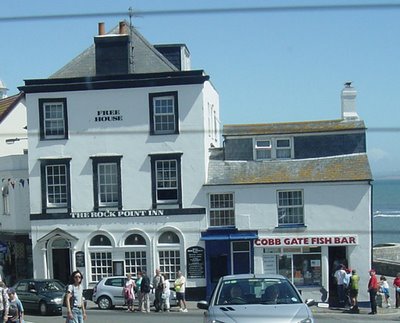
China is rising. Everybody knows. But what has it to do with England? It all started from piracy or the art of reproduction.
Liberated from the constraints of centrally planned economy, Chinese people have come to realise that fruits produced and distributed under free market economy bear more juice and taste more saccharine. The dragon finally woke up to the irresistible capitalism from decades' sound sleep and the Utopian dream of socialism.
In order to get on board the capitalist cruise down the river of fortune, Chinese people seize any opportunity to reap the benefit of economic reform: starting whatever private business, regardless of its size, capital structure and so on as long as it makes money. While this definitely contributes much to China's whirlwind economic growth, it causes problems, among which piracy is one of the toughest nuts to crack.
Virtually, from fake designer handbags and clothes, replicas of brand name watches, to bogus diploma and all sorts of permits or certificates, nothing can't be forged in China. There is always among 1.3 billion people a need of spending less to bathe in the same superficial glamour emitted from an adorable trade mark.
Although in piracy business reproducing a convincing verisimilitude of a genuine item is essential, sometimes there is a compromise. A deliberate twist of a trade mark may guarantee a position of never being sued while meeting users' need. Look at this masterpiece: set-of-four SQNY batteries. It's hard to say if SONY would win the case should they take it to the court.

The unauthorised use or reproduction of other people's work is absolutely a violation of laws; nevertheless, does this apply to all works created by human beings? What about an architectural piece?
In Songjiang, about 19 miles away from Shanghai, a major housing and commercial development called Thames Town has come to a successful end. This new town is really an exhibition of 500 years of British architecture: half-timbered Tudor buildings, white stucco Regency terraces, Victorian red-brick warehouses, gabled 20th century buildings, a covered market with distinct echoes of Covent Garden, a ferreted castle, a windmill, village greens and a Catholic church with a similar spire of St Mary Redcliffe in Bristol.
Do not doubt. Here is a newly constructed residential and commercial town in Shanghai, a picturesque 'Little Britain'.
What impressed me most are these two buildings which almost copy detail-to-detail the original two in Lyme Regis, Dorset, England. Make a comparison between the photo at the top and the one below.
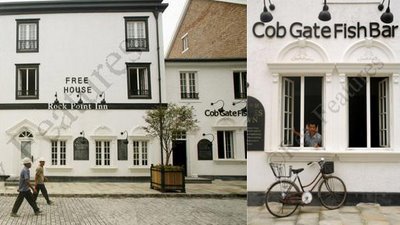
There are only very few differences, for example:
- The original buildings are fitted with sash windows, not two-fold casement windows.
- A window is missing on the first floor of the mock Rock Point Inn.
- A 'b' is missing in the copied Cobb Gate Fish Bar.
Nevertheless, can you copyright the façade of your building?
20 September 2006
Scottish rain reminds me of my childhood
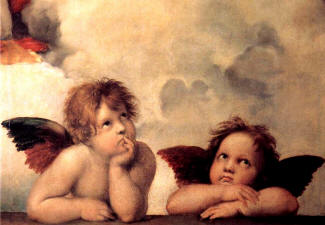
After a very long and unusually warm summer, Scotland is in Scottish weather again.
Those who don't mind a walk in the drizzle end up soaking in a downpour; those who are basking in the sun in short sleeves are smacked by the sudden falloff in temperature; those who insist that central gas heating should not be switched on until they put the clock one hour back give in to the cold.
Nevertheless, I'm absolutely fine with Scottish weather. I was born and have spent 22 years in Keelung, a harbour town half an hour away by car from Taipei, where it used to rain 280 days a year (By 'rain', I mean 'rain', not 'drizzle'). Interestingly, rain gradually disappeared in Keelung in the last 15 years, so much so that this town, which was once nicknamed Rain Harbour, has been badly affected by droughts for several times.
It is rumoured that the three colossal chimney of a power plant, which started operation in 1985, pumped the rain to a nearby town Sijhih. Since Keelung is no longer a harbour of rain, incessant rain in Scotland actually reminds me of my delightful yet freakish childhood in Rain Harbour.
Probably because of the childhood dream of emancipating myself from its boundage, I don't bother to use a brolly, although I have two, a black ordinary one, which has been with me for at least ten years, and a shiny one featuring Raphael's Two Cherubim (part of the famous Sistine Madonna), which my Fiancée bought for me three years ago when she visited the Vatican but I've never used so far.
While I might give in and use my shaky black umbrella when it pours, I would never use the Cherubim one because reproduced images of their innocent looks on the canopy really imply a stupid question: why it rains so much and so unpredictably in Scotland.
Even though I am a cold weather person and wet days don't really distress me, as the days draw in and the mornings get darker in the British Isles, a downward trend in my coma score is certainly something that can be observed by any non-medical trained layman.
19 September 2006
Francesca is swotting up on Chinese
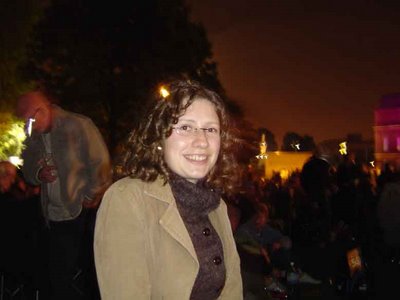
(Proms in The Park 2006, Glasgow)
Having just been awarded a bachelor's degree in history with a first-rate dissertation this summer and won a scholarship from the department, Francesca steps further for a master's with a view to a doctoral programme. She enrolled a week ago, was allocated an office and is officially a postgraduate student now.It's quite understandable why she is still in sort of over-the-moon mood: What could be more exciting than enjoying full entitlement to all the facilities for research students? What could be more exhilarating than reading what you need instead of what you are demanded?
Lucky her. On the induction day there wasn't an unsmiling stern dean or head of department welcoming new postgrads with a frigid speech laying stress on the solitude, loneliness, frustration and suffocation one would encounter during their postgraduate study. Instead, she met other students and befriended them in Stirling Postgraduate Society, a secret society less secret than Masonry, but so esoteric that I myself didn't even join in during my postgraduate career at Stirling.
However, as her master dissertation will examine post-Mao Chinese cinema and therefore a knowledge in the Chinese language is required, under my cruel yet reasonable supervision, she swots up on Chinese everyday – contorting her vocal cords to produce different pitches in the language, twisting her Brit tongue to pronounce alveolar, alveolo-palatal or retroflex affricate consonants and close back unrounded vowels, puckering her spaghetti lips to enunciate the umlauted vowel 'u', and engaging in mental drudgery to thread up some rosaries of Chinese characters which would make sense all together.
Francesca is making good progress and, I guess, will sooner or later outdo my lovely fiancée Fanne, who always have problems to articulate correctly every single word in one sentence in her mother tongue, Chinese. For example, Fanne can't even be bothered to read (by this I mean 'to browse') my favourite Chinese text The Story of Mr Shi Eating Lions on my weblog, let alone to recite it.
My dear Francesca, you are now desired by your big brother Wei to equip yourself to declaim this Chinese text by the end of this semester.
15 September 2006
The 'Fork Handles' sketch from The Two Ronnies
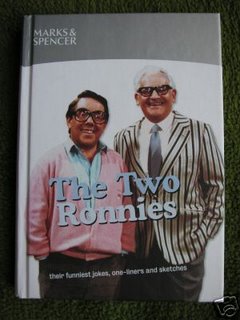 I've never thought I would become an eBayer, but I did give it a go and successfully won a bid – a hardback book of The Two Ronnies, selections of their funniest jokes, one-liners and sketches, for only 99 pence.
I've never thought I would become an eBayer, but I did give it a go and successfully won a bid – a hardback book of The Two Ronnies, selections of their funniest jokes, one-liners and sketches, for only 99 pence.As I learnt English in Taiwan mostly by listening to BBC World Service and reading Jane Austin's novels, before coming to Britain, I supposed I didn't have to worry about how to speak proper English. However, most people I met in the British Isles simply looked at me with a friendly yet seemingly sardonic smile, pondering what bloody period I was from, when a torrent of archaic, over-mannered words poured from my mouth.
Gradually, I realised that nowadays Brits would not speak in the way a Georgian or Victorian butler did, nor would they chant verses of Shakespeare or Milton in their daily life. Just as what the saying 'when in Rome, do as the Romans do' suggests, I shall say what the Britons say when I'm in Britain.
Therefore, I had no choice but switched from period dramas to comedies, such as Yes Minister, Blackadder and The Two Ronnies, so that I could learn more practical, somewhat up-to-date English expressions, and meanwhile to sharpen up my sense of British dry humour.
The famous Fork Handles, which was voted the Nation's Favourite Sketch, is also included in the book I've just received. In this sketch an ironmonger became increasingly frustrated while serving a thickhead because he kept misunderstanding what his customer really asked for, as a result of the items required being homonyms of the items provided:
- four candles v.s. fork handles
- bath plugs v.s. electric plugs
- sore tips v.s. saw tips
- garden hoes, garden hose v.s. letter 'O's for the garden gate
- letter 'P's v.s. tins of peas
- pneumatic pumps v.s. pumps for feet
- windscreen washers, car washers, dishwashers, hair washer, etc v.s. tap washers
12 September 2006
Beyond impeachment

(Image from BBC website)
While all the time China elbows Taiwan out of all sorts of official international organisations and nowadays most Western countries pay more attention to China, Taiwan has recently regained some international media coverage.Much to my embarrassment, it is the corrupt Taiwanese president Chen Shui-Bian, his avaricious in-laws and his venal aides who bring this island, which has almost dumped by most Western countries into oblivion, back on the global stage.
Protesters in their red outfits have congregated in front of the presidential office in Taipei since the 9th of September to demand Chen's resignation. This claimed grassroots demonstration catches the eyes of some news editors, to name a few:
- BBC, 'Taiwanese keep up Chen pressure'
- CNN, 'Protests target Taiwan president'
- The New York Times, 'Thousands of protesters call on Taiwan's president to step down'
- The Asahi Shimbun (Japan), '陳総統の辞任求め9万人 台湾で一部は座り込み開始'
- depose: to remove from office suddenly and forcefully
- dethrone: to remove a ruler, particularly a monarch, from power
- dislodge: to remove from an established or fixed position
- oust: to drive out or expel from a position or place
- overthrow: to remove forcibly power
- unseat: to remove from a position of power or authority
11 September 2006
Finally I was in the Last Night of Proms
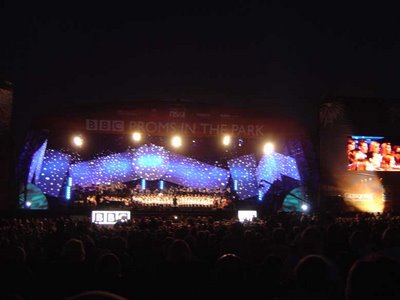
Finally, I made my debut in the Last Night of the Proms last Saturday, though as a spectator rather than a performer, and though not in the real one at the Royal Albert Hall but the Proms in the Park in Glasgow Green, one of the five outdoor venues across the country. Nevertheless, unlike those in Hyde Park who had to pay £ 23, in Manchester £12.50 and in Swansea £7.50, I simply requested for and then, as lucky as those in Belfast, was randomly selected by the organisers in Glasgow to win free tickets.
Under the same theme Proms in the Park as they were, all of the outdoor venues in fact had their own concert programmes, and were only teleconnected with the Royal Albert Hall for about 20 minutes.
It seems that every year at the last night of the Proms, the whole country is reunited by classical music and the bygone glory of the British Empire is therefore reinvigorated. People from every corner of the country shoulder their way into the Royal Albert Hall for the Last Night by attending at least six other Proms beforehand during the Proms season in order to be qualified to buy the ticket, or simply by paying the exorbitant price to secure a seat through certain agent.
However, there is always a touch, or actually a distinct odour, of nationalism – not in terms of the United Kingdom as a whole, but rather, four constituent nations individually.
While in Hyde Park and Manchester St George's crosses sprinkled over the sea of fluttering Union Jacks, in Glasgow I could only count those Union Jacks immersed in Saltires on the fingers of one hand. I supposed in Swansea Union Jacks must have been shovelled down by their red dragons.
I have been practising Jerusalem and Land of Hope and Glory long before this great night, but as much as it has been worrying me, in Glasgow the linkup with the Royal Albert Hall on the screen was cut off and switched to Glasgow Green on the scene after we carolled Rule! Britannia.
I couldn't understand why for the Scottish singing Rule! Britannia while waving Saltires was less absurd than chanting Jerusalem or Land of Hope and Glory with the English. Though it may be regarded as nothing unusual by Britons, speaking from my own viewpoint, the smell of this sort of regional nationalism is much more pungent on site than on TV.
Anyway, it was a pleasant night with the good company of my English siser Francesca, my landlady Val and her friend Jane - none of whom are Scottish.

